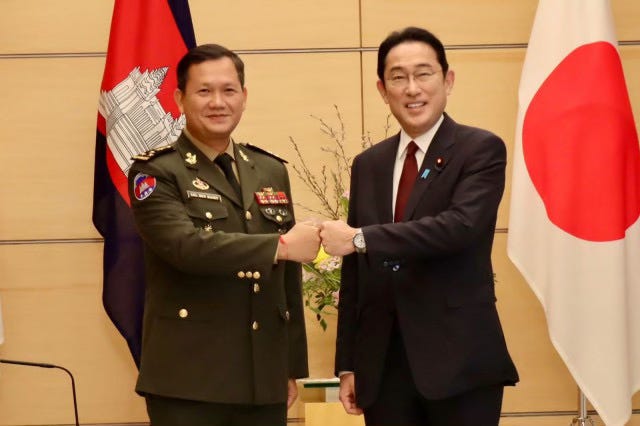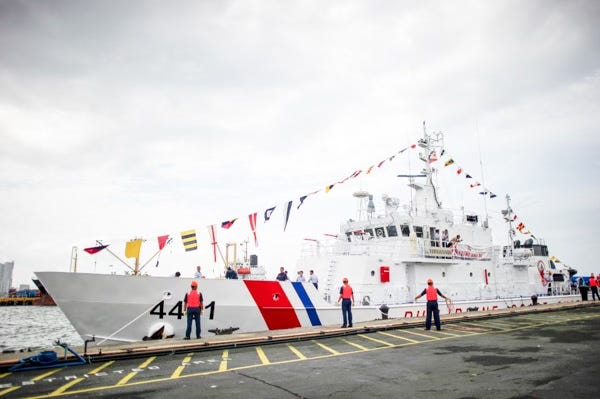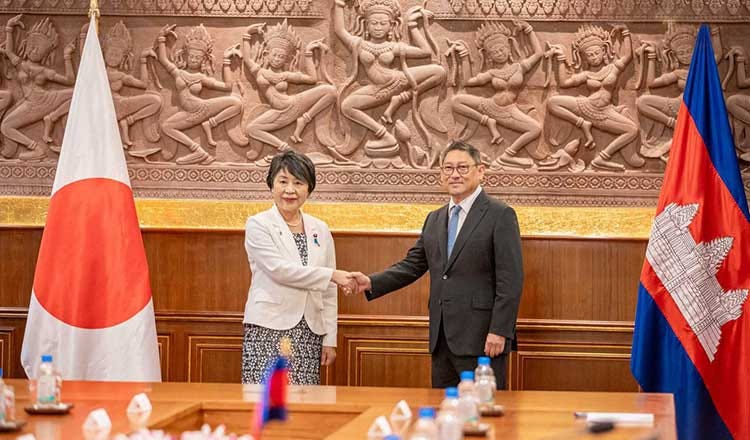Cambodia's Robust Bilaterals
PM Hun Manet Emphasises FDI, Cambodia, Japan-Cambodia bilateral and multilateral cooperation, Japan supplies Cambodia and four other ASEAN states with patrol boats
PM Hun Manet Appraises French FDI
By Anthony Ellis (EAC News)
Prime Minister Hun Manet presided over the French-Cambodian Business Forum in Phnom Penh. In his keynote speech, the Prime Minister highlighted the robust Cambodian-French cooperation, noting that it extends beyond politics and development assistance.
French economic collaboration remains significant, with France being one of Cambodia’s largest trade and investment partners in Europe. Bilateral trade reached $515.21 million in 2023 and $206.41 million in the first five months of 2024.
Numerous French companies, from multinationals like Vinci, Total Energies, Accor, and BRED Bank, to small and medium enterprises, have established operations in Cambodia.
French investments have contributed to job creation, skill transfer, and infrastructure development, underpinning Cambodia’s sustainable economic growth.
The Prime Minister invited all French investors to explore the vast investment opportunities in Cambodia and capitalize on the strong bilateral relations between the two countries. He welcomed the strategic decisions of investors, particularly French investors, who choose to invest directly in Cambodia or form partnerships with local investors.
Prime Minister Hun Manet reiterated Cambodia’s readiness to support and warmly welcome all investors and businessmen from around the world. The Royal Government of Cambodia is committed to the well-being of investors, addressing their challenges, and strengthening relationships with the private sector to resolve emerging issues efficiently.
The government’s principle of "thinking together, acting together, and taking responsibility together" has led to the development of mechanisms such as the Royal Government-Private Sector Forum, which facilitates the expression of concerns and suggestions from the private sector.
In recent months, significant progress has been made in improving the business environment. The government has reduced the burden on the private sector in areas such as business registration, licensing, employment compliance, and accounting and auditing compliance.
High priority has been given to comprehensive tax reform, with the development and implementation of standard operating procedures to address concerns related to audits and tax assessments. These reforms aim to enhance the efficiency, predictability, and transparency of tax administration.
Trade facilitation has also been promoted through measures such as reducing logistics and transportation costs, introducing the National Single Window system, and completing customs clearance before goods arrive (pre-arrival processing).
The Prime Minister expressed gratitude to the French Chamber of Commerce and Industry in Cambodia, the French Foreign Trade Adviser in Cambodia, and the Cambodian Chamber of Commerce for their joint efforts in organizing the prestigious event for the second time.
He emphasized that this forum is a valuable opportunity to strengthen the friendship and explore the economic partnership potential between Cambodia and France.
Cambodia-Japan bilateral and multilateral cooperation
By Khmer Times
Cambodia and Japan this morning pledged to continue bilateral and multilateral cooperation for regional peace and prosperity. The pledge was made in an approximately-90-minute courtesy meeting here at the Peace Palace between Cambodian Prime Minister Hun Manet and visiting Japanese Minister for Foreign Affairs KAMIKAWA Yoko, during her two-day official visit to the Kingdom of Cambodia.
Minister Kamikawa stated that areas of collaboration for Japan and Cambodia are steadily expanding after many years of cooperation.
Regarding the future bilateral cooperation, she expressed her desire to collaborate in the strengthening of Cambodia’s sustainability and further co-creation of social value, focusing on human resource development and the use of Japanese technology.
For his part, Hun Manet welcomed Minister KAMIKAWA’s visit, appreciated the long-standing support from the Japanese government and people for Cambodia, and stated that he would like to advance cooperation between the two countries under the “Comprehensive Strategic Partnership.”
Also, in response to Minister KAMIKAWA’s welcome to the recent appointment of Reserve Judge Motoo NOGUCHI to the Khmer Rouge Trial Supreme Court Chamber, Prime Minister Hun Manet expressed his hope that the Judge would play an active role.
On the bilateral relations, KAMIKAWA Yoko expressed her desire to advance cooperation in the water and digital technology fields, which are Japan’s strengths, to support Cambodia’s focus areas in sustainability and development of a digital economic society. She added that, in the digital technology field, she would like to proceed with the Co-Creation for Common Agenda Initiative.
Kamikawa also expressed her desire to utilise Japan’s expertise and cooperate with Cambodia to develop a core communication infrastructure, including 5G capabilities, and to continue cooperating with Cambodia to strengthen cyber security.
On this point, Prime Minister Hun Manet stated that the Japanese water-related support is important for the health of Cambodian people and that the Cambodian government places importance on the development of a digital economic society and would like to promote cooperation with Japan.
Moreover, the Japanese foreign minister expressed her willingness to advance cooperation to develop Sihanoukville Port as a hub port and logistics base in the region.
She said that she would like to cooperate with Cambodia in attracting investment from Japanese companies and announced that the Government of Japan has decided to provide an ODA loan of 8 billion yen for the Phnom Penh City Transmission and Distribution System Expansion Project to improve the investment environment.
Prime Minister Hun Manet said that the Royal Government of Cambodia also emphasises the development of Sihanoukville Port as a hub port and logistics base in the region. He expressed his wish to continue to collaborate with Japan.
Read more here.
Japan to supply 5 countries with free patrol boats to counter China
By Yomiuri Shimbun (repost from August 2023)
The government has begun discussions on the free provision of defense equipment to six “like-minded” countries’ next fiscal year under the Official Security Assistance (OSA) program, according to several government sources.
To provide material to such nations as Vietnam, Mongolia and Djibouti, the Foreign Ministry hopes to include related expenses of about ¥5 billion — 150% more than the current fiscal budget — in its fiscal plan for 2024.
The OSA is a new cooperation framework aimed at strengthening the security of countries that share common foreign policy objectives with Japan on specific issues, by providing equipment and supplies to their armed forces, while also supporting development of their respective infrastructures. The government will decide on the target countries based on their democratic principles, rules of law, respect for basic human rights and economic and social conditions.
Amid the present complex security environment, Japan is keen to enhance the security capabilities of like-minded countries in geopolitically important locations, with an eye on keeping China’s maritime expansion and military buildup in check.
Unlike Official Development Assistance (ODA), which is limited to nonmilitary assistance, the OSA — which was stipulated in the National Security Strategy revised last December — allows the provision of direct support for the militaries of certain countries. Developing nations, in principle, are eligible for such aid, which is provided under the Three Principles on Transfer of Defense Equipment and Technology and its Implementation Guidelines.
Fiscal 2024’s OSA is earmarked for Vietnam, Indonesia, the Philippines, Papua New Guinea, Mongolia and Djibouti.
Vietnam, Indonesia and the Philippines have ongoing territorial disputes with China in the South China Sea; Papua New Guinea is a Pacific island nation where China is attempting to strengthen its influence; Mongolia borders China and Russia; and Djibouti sits in a strategic position amid Japan’s sea lanes and hosts a Self-Defense Forces’ base.
For this fiscal year, the government has budgeted ¥2 billion to be dispensed to the Philippines, Malaysia, Bangladesh and Fiji. Japan intends to continue providing aid to the Philippines, deeming that nation to be in high need of assistance.
To enhance its ability to monitor territorial waters and airspace, Japan also is considering providing recipient nations with small security vessels, radar, drones and communications equipment, including radios. Final decisions regarding recipients and levels of assistance will be made after consulting with partner countries and conducting on-site surveys.
The government decided April to limit OSA assistance to areas that are unlikely to play a role in international conflicts, such as by surveilling territorial waters and airspace or conducting humanitarian rescue operations.
Periodic checks will be conducted to discern whether the equipment provided to recipient countries is being used appropriately in accordance with the rules.
Read more here.
Japanese patrol boats for Cambodia
By South Koem Soeun (Khmer Times)
The Cambodian National Police expects that the patrol boats donated by the Japanese government will meet the needs of the nation’s Maritime Police in providing border security in coastal areas.
Lieutenant General Chhay Kimkhoeun, Deputy National Police Chief and Spokesman of the National Police, said yesterday “The patrol vessels will be vital for Cambodian Maritime Police in providing security and rescue operations along Cambodia’s water border.”
“The patrol vessels that Cambodia currently uses are old and cannot meet the authorities’ needs, and they are small vessels and lack modern technology,” he said.
“We are pleased to hear that the Japanese government will supply modern patrol vessels, which will assist in strengthening patrols and rescue missions,” he said.
“We have clear policies and strategic plans to safeguard our territorial integrity, national sovereignty and provide security along both land and water borders,” he said
Lt Gen Kimkhoeun said that the Maritime Police use patrol boats to intervene in crimes committed at sea, such as people attempting to illegally enter Cambodia by sea.
The Maritime Police leadership also has many other duties for officers to perform, he said.
He called on all border police officers to protect border posts and surrounding areas, especially towards curbing cross-border crime, terrorism and piracy, as well as to share information that could prevent crime.
Kamikawa Yoko, Minister of Foreign Affairs of Japan, paid a two-day official visit to Cambodia on Friday and Saturday and held meetings with Senate President Hun Sen, Prime Minister Hun Manet, Minister of Foreign Affairs and International Cooperation Sok Chenda Sophea, and Heng Ratana, Director General of the Cambodian Mine Action Centre (CMAC).
The Ministry of Foreign Affairs and International Cooperation released a statement on Saturday that said the two ministers shared the view of further developing friendly relations between Cambodia and Japan, how to further enhance the Comprehensive Strategic Partnership, and expand cooperation in other sectors beneficial for both countries.
“The two ministers expressed satisfaction with the progress of close cooperation in the field of defence and security, and commended the outcomes of the First Cambodia-Japan Senior Officials’ Dialogue at the Vice- Minister of Defence level in Siem Reap province on March 1, this year,” the statement said.
“They also agreed to expand cooperation between the Cambodian Maritime Police and Japan’s Coast Guard. Kamikawa informed that the Japanese government will provide patrol vessels to the Cambodian National Police,” it added.
Read more here.







